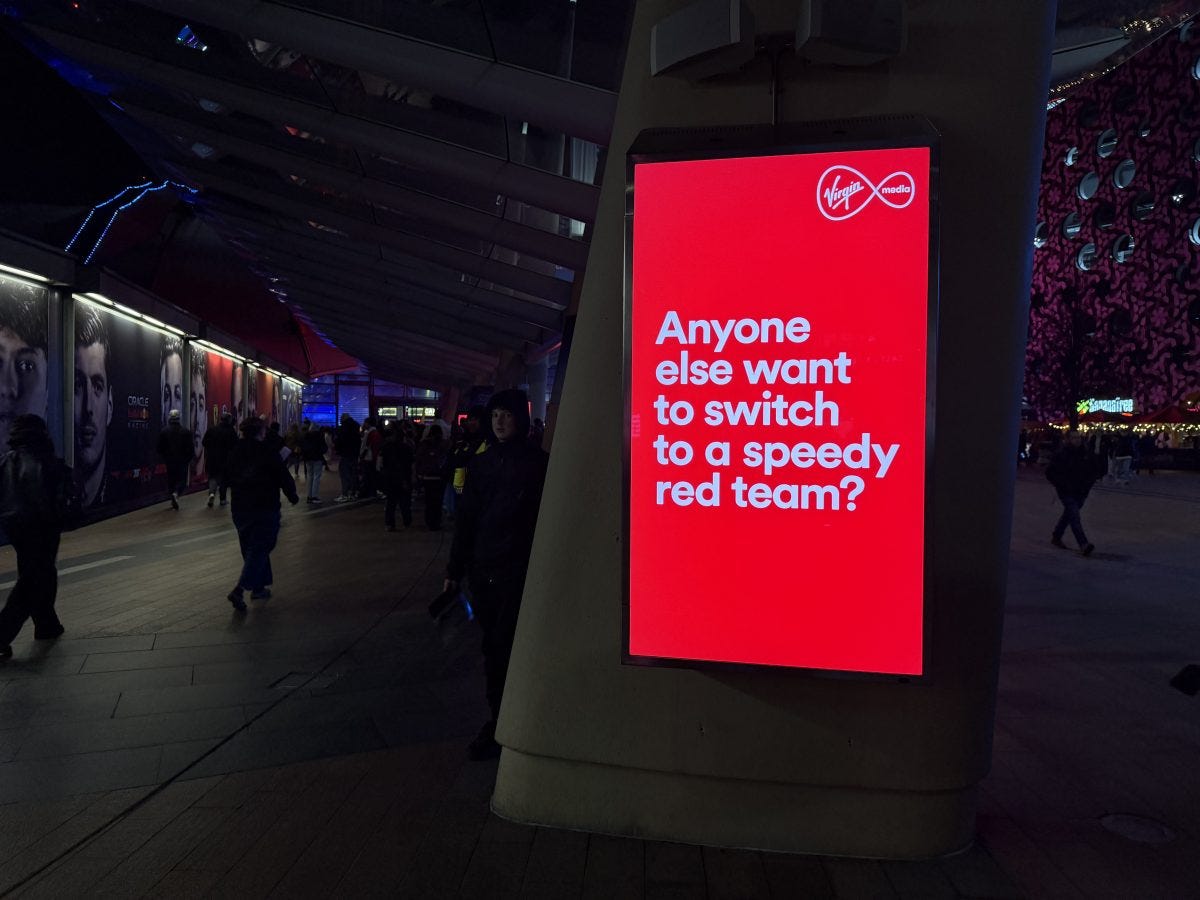Morning coffee antics are back this week. It's 5am as I write this, and I am sipping cup no. 7. The reason?
We're working on a way to redesign what marketing deliverables should look like in a brief. If you've got any ideas - let me know!
Anyway, this week I got very interested in the idea of 'trials'.
Here's the work from Jameson, Virgin Media (kind of) & Tesco.
1. Jameson: You Don't Have to Ask Me Twice
As part of a multi-million pound campaign, Jameson are giving away their whiskey.
So there's much more to the campaign than just giving it away. There's an ad running across Sky Sports, some VoD services and YouTube. But there's also an experiential event going on at the Carabao Cup Final, on the 16th of March in London.
It's a month's worth of St Patrick's Day campaigning, but on the day, a Jameson bus will park up at Wembley and serve some drinks. Meanwhile, Jameson, ginger and limes will be given out at participating pubs across the country.
That last bit interests me a lot. Trials are funny things - the general bet is that the battle you need to win is getting your product in someone's hands. It's the product's job to be good enough for that to convince someone that they should buy it again.
Does it work? There is a fair bit of research that says yes, but it's odd that we rarely talk about trials in the same way we talk about discounting. One can devalue the brand, while the other builds a positive relationship between brand and customer...?
2. Virgin Media: Switching Broadband Never Gets Old
Virgin Media created a real simple, real fun ad lining up with the return of F1.
The campaign features out-of-home activations in the O2 arena and some newspaper placements - and is, for broadband, pretty funny. Lewis Hamilton's switch to Ferrari this season is the biggest story so far, and most fans are pretty excited to see how he does in the 'faster' car.
But, really, this is just an excuse to talk about another broadband campaign / offer.
Last year, EE announced a Switching Credit scheme - they offered up to £300 to cover the fees of switching broadband provider (like paying out the rest of your contract).
Broadband providers are CONSTANTLY trying to get you to switch. It's really the only move there is (outside of targeting renters / movers who need a new broadband connection).
EE's offer effectively turns switching into a trial. Part of the reason people don't switch is the hassle, and the other part is the cost. Paying out to your old provider, even if you want to change to a cheaper plan somewhere else, feels like a short-changed deal. "Removing" that cost effectively makes switching to EE free (since you'd be paying for broadband regardless).
From conception, this must be the most effective "free trial" there is - it's somehow a free trial that guarantees conversion. Kind of crazy when you think about it, and yes, fine, kind of a lie that this is in fact a trial at all. But if the point of a trial is to convince someone to buy from you by giving them something for free, then this roughly fits the bill. Square peg, diamond hole.
3. Tesco: A Trial OG - Story Time
Tesco marked the 30th anniversary of the Clubcard - a mechanism that has driven 'accidental' purchases for 3 full decades now.
The Clubcard itself has nothing to do with 'trials' in the traditional retail sense. But I thought it would be fun to peek back through history to when the first Clubcard trials were being rolled out.
Tesco wanted to launch a loyalty program. They had begun trials of it back in 1994. But the real trials happened with Dunnhumby, a data-driven marketing company born in a time when data wasn't really a thing. Analysing it was hard, and storing it was expensive.
Dunnhumby, founded by husband-and-wife Edwina Dunn and Clive Humby, had previously built some analysis techniques showing different neighbourhoods exhibited different buying behaviours. The couple had either resigned or lost the jobs at which they did that work, and looking for a new source of income, they had the idea that if they had access to real, live customer data (where before, they didn't), they could understand buyers better than anyone else - and get them to spend more every shop.
After Tesco engaged them for the trials, some key findings were that people returned to stores more often and bought more when they were rewarded with money-off promotions, and that customers were not buying every item from just one store. Illusions about the way people shopped were shattered by a test-run that cost £250,000 - when Tesco had initially budgeted for £50m over three years. The presentation to the Tesco board fell silent, before Tesco chairman Lord MacLaurin famously declared:
What scares me about this is that you know more about my customers after three months than I know after 30 years.
It was a masterful bit of innovation. Other supermarkets were claiming more and more of the market - until Clubcard swelled Tesco's growth; it claims 3x more share today than it did before the scheme.
It's a story with a happy ending for the couple (they cashed in their shares for around £17m back in 2010), but a mixed ending for consumers. The vast amount of data that Clubcard and all of its imitators collect is not just held by the supermarkets, but sold to other businesses like Coke. In return, we get Lurpak reduced from (what feels like) £10bn to a more reasonable £4.
And what can any of us learn?
Not much - we already did learn. Every supermarket has a loyalty scheme now, collecting our data in exchange for a few quid off our weekly shop.
One thing to keep in mind, though, is why Dunnhumby's trial was so successful. As I mentioned, Tesco had already launched Clubcard. But they were struggling to do anything with the data because they were trying to work with all of it at once. Dunnhumby found that they could get to a 95-99% accuracy rate analysing just 10% of the data.
There are a million parallels to life in marketing - getting 10% really, really good instead of 100% pretty crap - but I leave that as an exercise for the reader...



